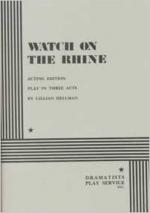|
This section contains 8,747 words (approx. 30 pages at 300 words per page) |

|
SOURCE: Patraka, Vivian M. “Lillian Hellman's Watch on the Rhine: Realism, Gender, and Historical Crisis.” Modern Drama 32, no. 1 (March 1989): 128-45.
In the following essay, Patraka discusses “how gender is thematized” in Watch on the Rhine.
To historicize a drama means understanding it in its changing socio-historical context and accounting for one's own critical stance toward that context. To historicize a drama also means understanding the role of its contemporary spectator as well as the spectator in our own time. According to Brecht, who first theorized this problem for the theatre, historicized works construct the spectator as an historian who is able to look objectively at the complex material conditions and human contradictions within the play's events and, by extension, within their own history. Brecht, however, had no interest in gender as a specific social phenomenon, so gender was not a historical context for him. In contrast, I assume...
|
This section contains 8,747 words (approx. 30 pages at 300 words per page) |

|


